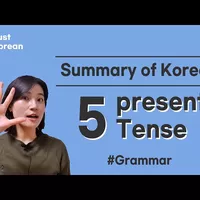(89) Summary of Korean : 5 Present Tense Grammar - YouTube
(89) Zusammenfassung von Koreanisch: 5 Gegenwartsform Grammatik - YouTube
(89) Summary of Korean : 5 Present Tense Grammar - YouTube
(89) Résumé du coréen : 5 grammaire du présent - YouTube
(89) Sintesi del coreano: 5 grammatica del tempo presente - YouTube
(89) 韓国語まとめ:5つの現在形文法 - YouTube
(89) Короткий курс корейської мови: 5 граматик теперішнього часу - YouTube
(89) 韩语总结:5 个现在时语法 - YouTube
(89) 韓語總結:5 個現在時語法 - YouTube
안녕하세요 그냥 한국어 지은입니다
Hello, I'm Jieun in Korean.
이번 영상에서는 지난 영상에 이어
In this video, following the previous video,
현재 시제를 한번 볼 거예요
we will look at the present tense.
현재 시제는 과거 시제 보다 조금 덜 복잡하니까
The present tense is a little less complicated than the past tense,
O tempo presente é menos complicado do que o passado.
한번 같이 봐요
so let's take a look.
많이 사용하는 현재 시제 모양에는 다섯 가지가 있어요.
There are five common present tense forms.
첫 번째 우리가 사전에서 찾으면 나오는 기본형
뭐예요?
'다, 이다' 이거예요
그래서 예를 들어서
하늘이 맑다
시간은 돈이다
Zeit ist Geld
뭐 이렇게 기본형을 사용하는 것도
현재 시제라고 볼 수 있어요
보통 이런 기본형은 글을 쓸 때 많이 사용을 하죠
두 번째 '는다'
이거 아시나요
지금 책을 읽는다
간다 먹는다
이렇게는 '는다'를 사용을 하면
'다'로 끝나는 문어체의 모습이지만
말을 할 때도 사용을 할 수가 있고
'지금 하고 있다'는 뜻으로 사용을 해요
그래서 현재 시제입니다
3번 동사와 명사가 같이 있을 때
현재 시제 어떻게 만들어요?
'는'을 붙이죠?
Add '는'' right?
받침에 상관없이 늘 '는'을 붙입니다
Regardless of a final consonant, always add '는'
이거 기억해두세요
remember this
그래서 예시를 한번 볼까요?
So let's look at an example.
지금 마시는 음료수가 뭐야?
What drink are you drinking right now?
지금 마시는 음료수가 뭐야?
What drink are you drinking right now?
이렇게 사용을 할 수가 있습니다
you can use like this
네 번째 형용사 + 명사 이때는 어떻게 사용해요
4th Adjective + Noun How to use this time
받침이 있으면 '은' 받침이 없으면 'ㄴ'을 붙이죠
If there is a final consonant, '은' If there is no final consonant, add 'ㄴ'
예를 볼까요
Let's see an example
귀여운 강아지
Cute dog
한국 가수인 그 사람은 목소리가 좋아
that singer who is korean has a good voice.
한국 가수인 그 사람은 목소리가 좋아
이렇게 합니다
다섯 번째 마지막 과거처럼
현재도 현재를 나타내는 시간 단어와 함께 쓸 때
지금, 오늘, 요즘 이런 현재를 나타내는 단어도
현재 시제로 볼 수 있어요
현재 시제도 과거 시제 처럼 몇 가지 특징 있는데
The present tense, like the past tense, has several characteristics,
그것을 한번 같이 볼게요
and we will look at them together.
첫 번째 보편적인 진리, 반복되는 습관 얘기할 때
The first universal truth, when talking about repeated habits,
이게 뭐냐면
I'll give you an example of what this is.
예시를 한번 볼게요
해는 동쪽에서 뜬다. 해는 동쪽에서 떠요.
이렇게 변하지 않는 정보를 이야기할 때
또 저는 매일 아침 따뜻한 물을 마셔요.
저는 매일 아침 따뜻한 물 마셔요.
여기서 매일 반복하는 일은 현재 시제로 말합니다
두번째 미래에 일어날 것이지만
확실하게 정해진 일
예를 들어서 나는 내일 제주도로 떠난다
나는 내일 제주도로 떠나요
이렇게 미래에 일어날 일이지만
확실하거나 미래를 나타내는 단어와 함께 쓸 때
but it's a story that shows the future even if you use the present tense
현재형을 써도 미래를 나타내는 이야기입니다
when used with words that are certain or indicate the future.
그리고 세 번째 문장 안에 두 가지 행동이 있을 때
The third, when there are two actions in sentence,
과거의 상황에서 현재
there is this case in the present
이 경우가 있어요
in the past situation
이게 무슨 뜻이냐면
I'll give you an example of what this means.
예시를 볼게요
도서관에서 책을 읽는 사람들이 많았다
There were a lot of people reading books in the library.
이거 보세요
Look at this.
'많았다' 마지막은 과거 시제이죠?
'There were many' is the past tense, right?
그래서 과거에 있었던 일이지만
So it happened in the past,
이 중간에 '있는' 현재죠?
but is it the present tense '읽는' in the middle?
왜 현재예요?
why the present tense?
그 옛날 상황에서 현재라고 생각하시면 됩니다
You can think of it as the present in the past situation.
그래서 우리 이렇게도 배워요
so we learn like this
과거 시제는 마지막 부분에 한번 쓰세요
이렇게도 배웠을 거예요
그게 이 3번 상황입니다 여러분
여러분 현재시제 이해가 되셨어요?
현재 시제는 이 문법을 다 배웠으면 한 번씩 확인해 보시고
예문을 만들어서 댓글에 달아 주세요
제가 한번 봐 드릴게요
그리고 아직 배우지 않은 문법 있으면
you haven't learned yet,
한번 찾아 보시는 것도 좋을 것 같아요
It might be good to look it up.
그러면 궁금한 점 있으시면 댓글 달아주시고
Then if you have any questions, please leave a comment
우리는 다음 영상에서 또 만나요
and see you again in the next video.
안녕히 가세요

